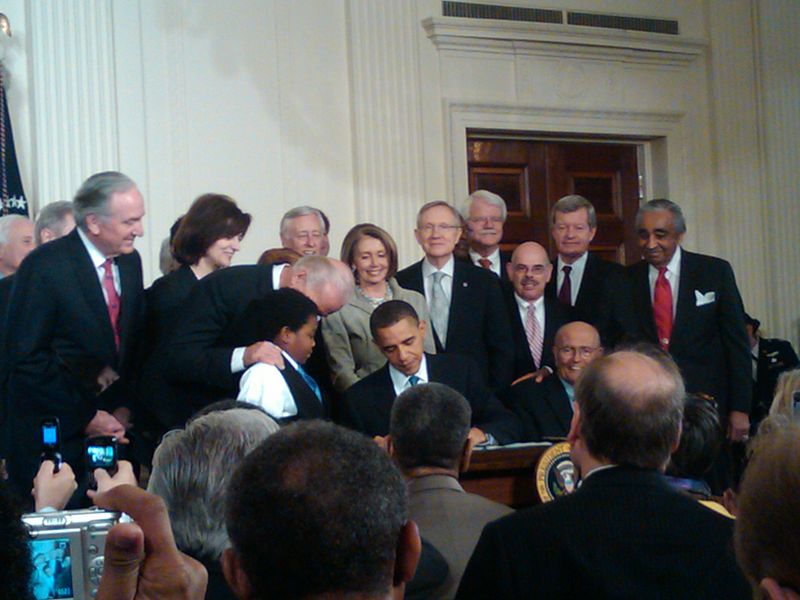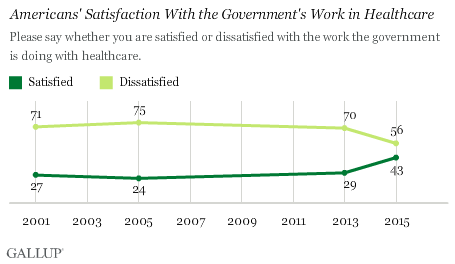
Republicans might be worried about this chart, the gold-standard Kaiser Foundation tracking poll of opinion on the Affordable Care Act, which shows approval for the law above water for the first time since the launch of HealthCare.gov:

But it’s blip and likely an outlier.
What they should be worried about is this chart, Gallup’s measure of Americans’ satisfaction with government’s role in health care, which is still underwater but up almost 50% since Obamacare was passed:

Given the undeniable success of the law, these statistics still show is how effective the anti-Obamacare campaign has been. But the GOP’s poll-tested argument against the law — “It’s a dang darn Government-takeover” — has been turned against itself. Republicans were told the government would ruin health care. Instead, people are seeing that maybe the folks who brought us Medicare are capable of doing some good stuff.
Of course, it’s no actual government takeover health care. (If it were, we wouldn’t have any uninsured Americans.) But Republicans have spent over a billion dollars insisting it is and the public seems to be listening.
Critics of the law have been proven wrong so often that they don’t even bother to defend themselves. None of their major complaints — shrinking coverage, skyrocketing costs, part-time work explosion — have materialized. While some states are struggling with the costs of maintaining their marketplaces, the containment of overall health care spending since 2009 has been nothing short of spectacular.
Health costs for the years 2014-2019 are now predicted to be $2.6 trillion LOWER than they were estimated before the ACA became law even as we’ve expanded coverage by an estimated 16 million Americans. And Americans are happier thus far with their marketplace plans than their employers’ offerings.
Thus far we’ve been unable to say how much of this was due Obamacare — though we know for sure if costs were rising by $2.6 trillion it would be blamed entirely on the law. But new evidence suggests that we’re radically cutting waste and reining in costs that are the primary driver of our long-term deficit problems.
In the New Yorker, Atul Gwande revisited McAllen, Texas, “a community with some of the highest per-capita costs for Medicare in the nation.” And what he found should cheer the heart of any compassionate fiscal conservative.
“U.S. health-care inflation is the lowest it has been in more than fifty years,” he wrote. “Most startling of all, McAllen has been changing its ways. Between 2009 and 2012, its costs dropped almost three thousand dollars per Medicare recipient. Skinner projects the total savings to taxpayers to have reached almost half a billion dollars by the end of 2014. The hope of reform had been to simply ‘bend the curve.’ This was savings on an unprecedented scale.”
And this is on top of the first finding that directly attributes a $384 million savings to reform in the law that rewards doctors who provide good care, just one of the crazy ideas in this radical government takeover that was supposed to destroy America.
But in a world where conservatives control the Supreme Court, progress is never certain.
With the fiscal future and well-being of American firmly on the upswing, Republicans may still get their wish of gutting the law through King v. Burwell an absurdist lawsuit that could give the Supreme Court’s conservative majority a chance to issue a “$21 billion middle class tax hike.”
“The ruling would create a hydra of loyal but politically disengaged Obama supporters, consumer groups, health care providers, and other actors, none of whom will be satisfied with Republican excuse-making and inaction,” The New Republic‘s Brian Beutler wrote, in a piece suggesting Republicans should hope they lose the case.
Beutler’s suggestion seems prescient as Republicans struggle to find some plan B in case they catch the monster truck they’ve been chasing. The most viable suggestion has been offered by the soon to be unemployed Senator Ron Johnson who has a plan that would raise premiums of millions.
The perils a right-wing dream no longer deferred now seem obvious to Karl Rove, who is looking beyond King and telling his pawns to drop the whole Obamacare repeal thing in general.
“Republicans better be ready to say what to do next,” Rove wrote in the Wall Street Journal.
But the 2016 presidential campaign is now in full swing.
If the court takes subsidies from millions, President Obama and Hillary Clinton will demand an immediate fix. And the severely conservative field of candidates, all of whom support repeal, will reflexively demand the opposite. In the Washington Post, Paul Waldman suggests that perhaps some moderating soul of the 30 or so candidates who will be on the GOP debate stage will offer some sort of viable alternative. But with Jeb Bush already struggling so much with the base that he’s having to barnacle himself to the worst president of the last century, don’t count on it.
This is the worst possible time for the Court to gut this law for Republicans because their smears have been disproved to anyone capable of discerning facts. And the GOP’s entirely manufactured freakout over cancellations in late 2013 — we now know there were no more policies revoked them than in a typical year — showed that people will protest even when you take shitty insurance away from them.
And while it may be good for Democrats to be able to run on restoring coverage and tax breaks for the middle class, it would distract from any real debate about improving the law, say reducing out-of-pocket costs with a public option in states with higher premiums, now that we know government isn’t half bad at this.
Republicans tried to turn Americans against health care as a public good. But their lust to destroy the law at any cost may end up sending voters running into the warm embrace of a future where America shrinks its debt by expanding government’s role in health care.



